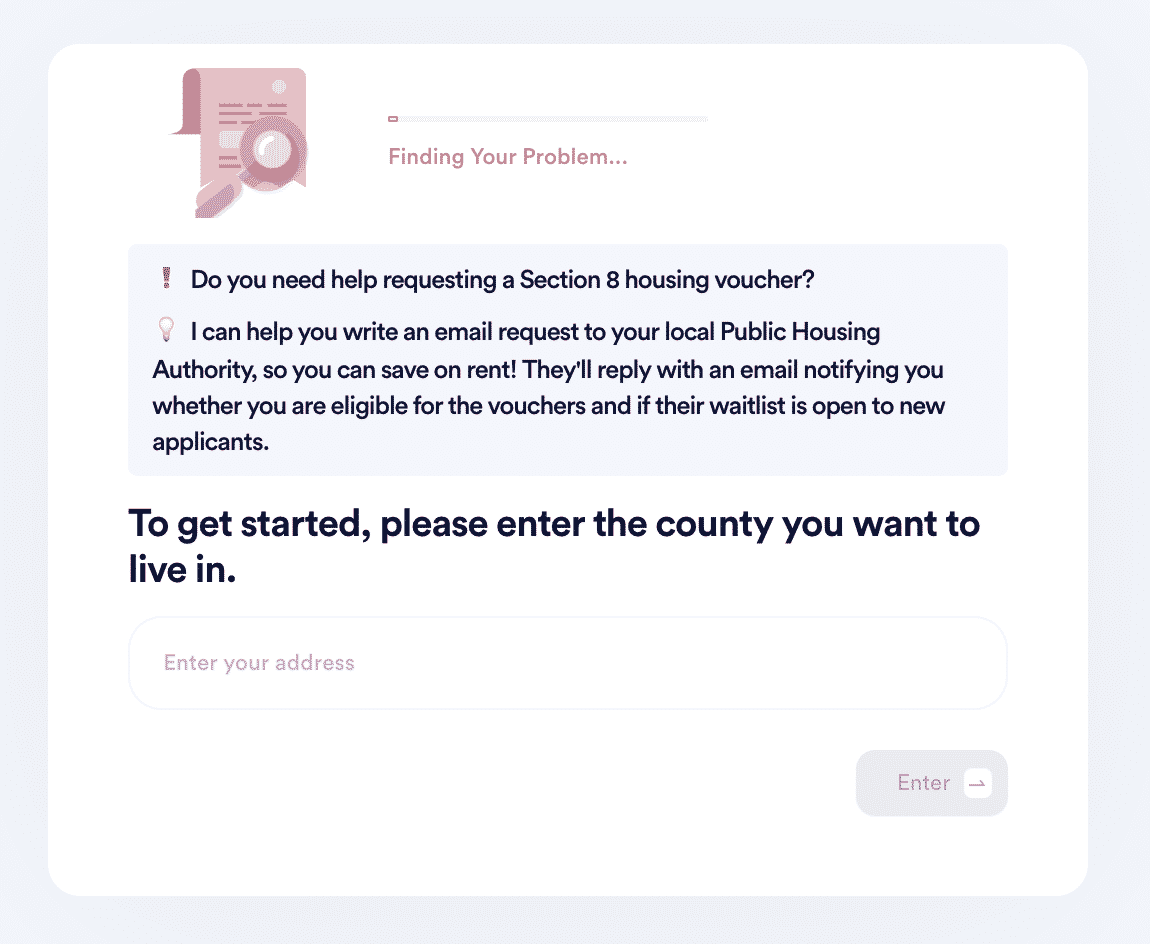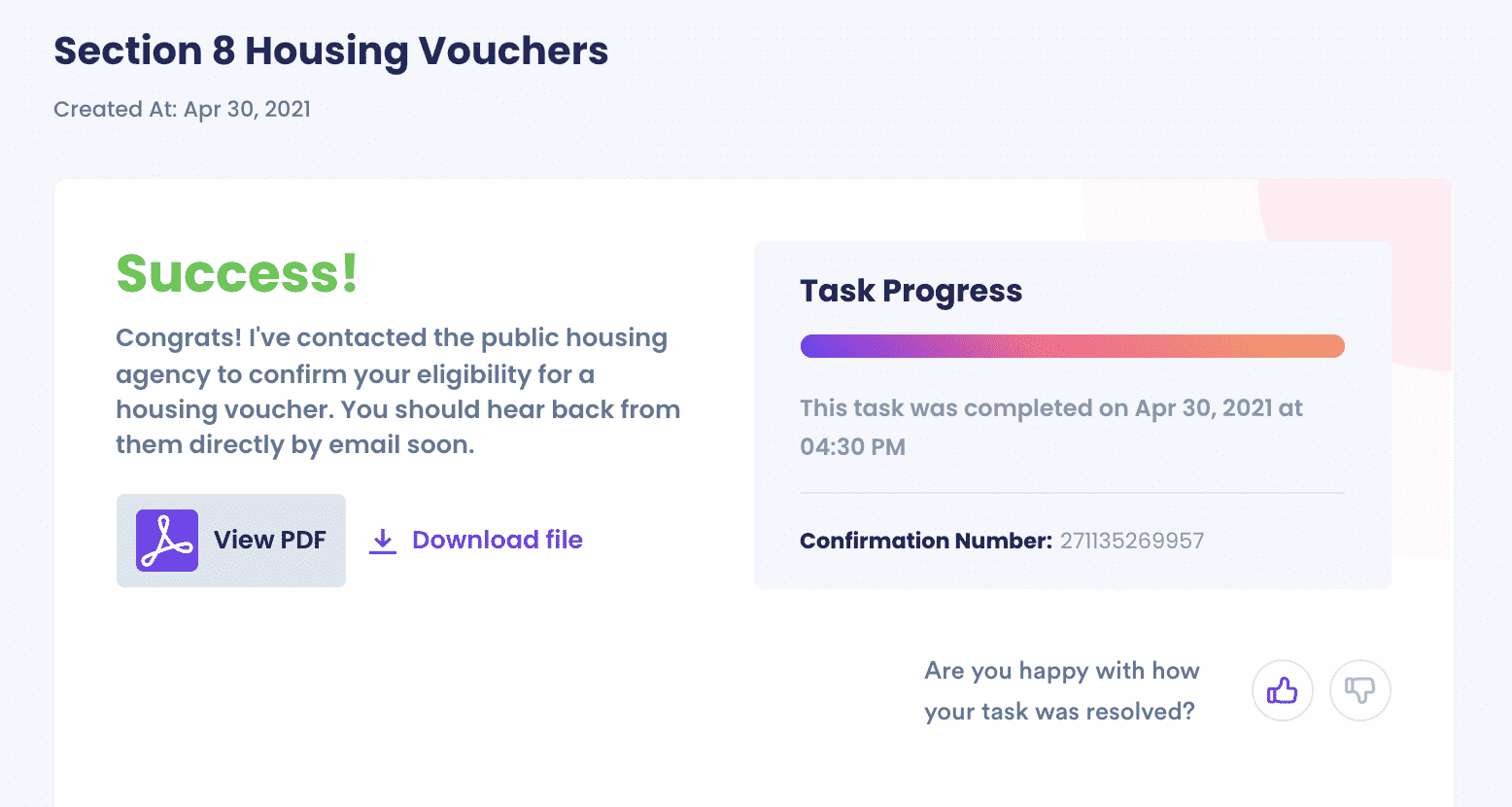A Beginner's Guide on How to Qualify for Low Income Housing
Wondering ? The qualifications are based on more than just your salary. If you have trouble getting started, DoNotPay can help.
Rent prices have spiraled out of control across the country since the COVID-19 pandemic began, even though people are making less money than they used to. Homelessness rates have increased exponentially. The low-income housing program, as originally envisioned by the Department of Housing and Urban Development (HUD), makes housing available to those who qualify due to their being unable to earn enough money to meet the needs of their families. The sheer number of those who fall into that category has left too many people homeless and on a waiting list for Section 8 benefits.
Low-income housing qualifications take into consideration more than just your income. Certain classes of people will take priority over others. In order to be able to take advantage of low-income housing, you need to qualify for the HUD Section 8 program. As previously mentioned, there is more demand than there is a supply of low-income housing. Waiting lists are the rule rather than the exception, and many waiting lists open too infrequently to help as many people as they should. Fortunately, there is a growing number of apartment complexes in each city that base the rent charged on a sliding scale depending on your income. These alternatives tend to follow the same requirements as Section 8. If you are having trouble getting started applying for low-income housing or Section 8, DoNotPay can assist you.
What Qualifies as HUD Housing and Section 8 Housing?
The most common low-income housing comes from HUD and the Section 8 Voucher program.
1. HUD Housing
HUD housing is usually apartment complexes. They can be either new construction or rehabilitated construction. The complexes will only rent to those whose income levels qualify as extremely low-income and those who make less than 80% of the median income level for the area.
2. Section 8 Housing
Section 8 housing works with landlords of private residences who are willing to accept the amount of rent equivalent to 40% of a family's gross income plus an amount subsidized by the federal government that together will equal the amount of rent the landlord is charging. The Section 8 Voucher Program also seeks to aid those with a low income to potentially purchase their first home. This benefit is not available everywhere, and it exists under the authority of the Public Housing Authority (PHA) in your area.
Eligibility for Section 8
In order to be eligible to apply for Section 8, you need to meet the following:
- Be 18 years of age or older.
- If not a citizen, you must prove that you are eligible for immigration.
- Have an income that meets standards ranging from low-income to 50% of the poverty level as determined by your city and state.
- The size of your family.
- No evictions from public housing within the previous three years.
- No drug convictions.
- Priority is given to veterans, seniors, and those with disabilities.
Proving You Are a Member of a Class Given Priority
| Veterans | Veterans must provide a military ID, Veterans ID, VA card for healthcare, or designation on your driver's license that you are a veteran. |
| Disabled | A benefits verification from Social Security should note the date that you were declared disabled. |
| Seniors. | Your driver's license or ID card shows your birth date. |
Finding Low-Income Housing
Finding low-income housing can be a challenge as many low-income properties have a waiting list.
Once you qualify for Section 8, you will have access to the lists of which Section 8 communities have rentals available. If you have been wait-listed for Section 8, you can find complexes that use a sliding scale to determine rent. Sliding scale properties will base an affordable rental price based on what level of low-income you are determined to be, such as low-income, 30% of median income, 50% of median income, 80% of median income as well as family size will determine what rental price you can be charged.
Other than the Section 8 site, there are links from the national HUD site to resources in your area. If you do a search, there are a number of websites that specialize in low-income housing availability. The more resources you can gain access to, the better the chance that you will be able to find an affordable property to rent.
How to Apply to Low-Income Housing Programs
Your first step for starts with HUD.
- Visit the Public Housing Authority in your area, either online or in person.
- Complete the application on their site.
- Get redirected due to the area you are applying for having waiting lists.
- Apply to any waiting list you can qualify for, or
- Wait for a waiting list to be open to new applicants.
- Spend more money on rent that you cannot afford while waiting for the waiting list to open up.
- Look for alternative housing with a sliding scale rent available.
- Conduct searches for sites that specialize in low-income housing.
- Access lists of properties from those sites.
- Apply for as many low-income housing units as you can.
- Prove your income to the potential landlords through bank statements, tax returns, and check stubs.
- Pray that your application is accepted as opposed to becoming homeless.
- Frequently check the Section 8 housing lists for an opening to a waiting list.
- Pray some more.
Using DoNotPay to Apply for Section 8 Housing in Your City
If you are having trouble applying for Section 8, DoNotPay can help.
If you want to apply for Section 8 housing in your city but don't know where to start, DoNotPay has you covered in two easy steps:
- Answer a few questions about your income, family size, veteran/disability status, which county you hope to live in, etc.

- DoNotPay will find the PHA in charge of that county and contact them with all of your eligibility information to determine if you can start applying. They'll get back to you directly via email with the next steps.

Why Use DoNotPay to Apply for Section 8 in Your City?
When you use DoNotPay to apply for Section 8 and find low-income housing in your area, the results are:
- Easy – DoNotPay knows Section 8 and will ask you a few questions to get started.
- Fast – Getting help from DoNotPay begins with the quick click of a button.
- Successful – DoNotPay will successfully contact your local public housing authority with your information.
DoNotPay Can Solve Problems Across All Areas
DoNotPay is not just limited to helping you find low-income housing. They solve problems in any area.
Do you need to make a DMV appointment? DoNotPay has you covered. How about paying a parking ticket or contesting a speeding ticket in another city? DoNotPay has tools for those as well. Do you need an excuse to get out of jury duty? DoNotPay helps you to escape. Are you trying to ask for a raise? DoNotPay helps people with that too. You can also get free trials without risk, cancel subscriptions and memberships, and take care of registering your dog licenses with DoNotPay on your team.
There is very little that DoNotPay doesn't do. Visit them today to see which problems they can help you solve.
What Else Can DoNotPay Do For You
Some of the other solutions that DoNotPay can help with include:
- Payday loans negotiations.
- Decrease the APR on your credit cards
- Get help with bills
- File a case in small claims court
- File a complaint
- Find your missing money
- File for Bankruptcy
If you are ready to start solving problems with the click of a button, visit DoNotPay today to see what else they can do for you.
 By
By